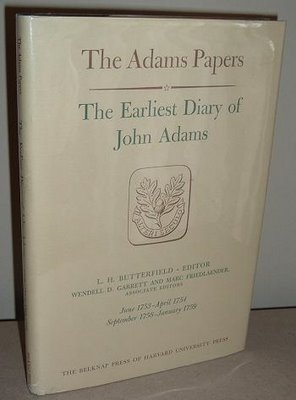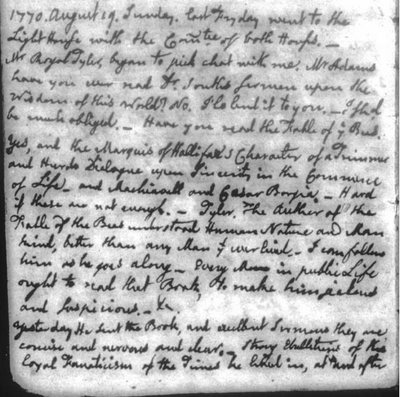 An exhibit at the Boston Public Library, titled John Adams Unbound, reminded me of a book on my shelves: The Adams Papers: The Earliest Diary of John Adams, edited by L.H. Butterfield; The Belknap Press of Harvard University, Cambridge, 1966.
An exhibit at the Boston Public Library, titled John Adams Unbound, reminded me of a book on my shelves: The Adams Papers: The Earliest Diary of John Adams, edited by L.H. Butterfield; The Belknap Press of Harvard University, Cambridge, 1966. 
I looked through the index for a clue to Adams’ book collection, the kinds of things he liked to read or collect, and any thoughts he may have recorded about a passion for books. By the way, here’s a related article in the Boston Globe. Anyway, I found reference to an entry in a later diary outside the scope of Butterfield’s book, which involved an eager acceptance of book recommendations from a Mr. Tyler.
As a rising young lawyer in 1770, Adams made the acquaintance of Royall Tyler, who recommended an eclectic variety of reading that, Butterfield writes, Adams took quite seriously. I assume this means he bought or borrowed and read these works, which provides insight to the curious and interesting tastes Adams had in books. The titles he took to heart from Tyler included Dr. South’s sermon upon the Wisdom of this World; Fable of the Bees, by Mandeville; Character of a Trimmer, by Halifax; Hurd’s Dialogue upon Sincerity in the Commerce of Life, Machiavelli and Caesar Borgia.
These books are mentioned by Adams in a diary entry dated 1770, August 19—much later than the date ranges for the entries in Butterfield’s Adams Papers. But Butterfield references them in that entry. The actual pages can be viewed online at the web site for the Adams Family Papers at the Massachusetts Historical Society.
As a rising young lawyer in 1770, Adams made the acquaintance of Royall Tyler, who recommended an eclectic variety of reading that, Butterfield writes, Adams took quite seriously. I assume this means he bought or borrowed and read these works, which provides insight to the curious and interesting tastes Adams had in books. The titles he took to heart from Tyler included Dr. South’s sermon upon the Wisdom of this World; Fable of the Bees, by Mandeville; Character of a Trimmer, by Halifax; Hurd’s Dialogue upon Sincerity in the Commerce of Life, Machiavelli and Caesar Borgia.
These books are mentioned by Adams in a diary entry dated 1770, August 19—much later than the date ranges for the entries in Butterfield’s Adams Papers. But Butterfield references them in that entry. The actual pages can be viewed online at the web site for the Adams Family Papers at the Massachusetts Historical Society.

This later diary entry lends credence, I believe, to a point Butterfield made of Adams’ persistent self-examination about his intellectual capacity and ability to live up to certain ideals. In other words, it appears self-doubt was constantly creeping up from Adams’ subconscious. And so he countered such negativism by reading classic treatises on law to better grasp the theory of law. He also read the great orators and poets to become artful in “moving the passions of men in a courtroom.”
May not Genius [of a different and lesser kind] be shewn in aranging a Mans Diet, Exercise, Sleep, Reading, Reflection, Writing &c. in the best order and Proportion, for His Improvement in Knowledge?... Patience or a great Superiority to a mans own unsteadiness, is perhaps one of the greatest Marks of Genius. Inatention, Wandering, Unconnected Thoughts, are the opposites to this Patience.
Lest you get the idea that Adams gobbled up books in a voracious manner, below is an interesting passage that seems to dispel that notion by reflecting on his struggle for self-improvement against the procrastination he felt at times. He worried about whether he had the right stuff to achieve the lofty goals he set for himself.
What is this Cause of Procrastination? To day my Stomack is disordred, and my Thoughts of Consequence, unsteady and confused. I cant study today but will begin tomorrow. Tomorrow comes. Well, I feel pretty well, my head is pretty clear, but Company comes in… Ballast is what I want, I totter, with every Breeze. My motions are unsteady…. I have so many Irons in the Fire, that every one burns.
These self-revelations from Adams help to transform him from the dusty pages of history (dusty for the unacquainted such as myself) to a man any of us today could relate to. We all struggle at one point or another with self-doubt, our abilities, goals, or dreams. That one of America’s most revered founding fathers, and second president of the United States, could walk upon such common ground with the rest of us is a bit inspiring for moving beyond those barriers that get in the way at times of achievement. So taking a page from the Adams diary, literally, the way to elevate one's self... books, books, and more books!
May not Genius [of a different and lesser kind] be shewn in aranging a Mans Diet, Exercise, Sleep, Reading, Reflection, Writing &c. in the best order and Proportion, for His Improvement in Knowledge?... Patience or a great Superiority to a mans own unsteadiness, is perhaps one of the greatest Marks of Genius. Inatention, Wandering, Unconnected Thoughts, are the opposites to this Patience.
Lest you get the idea that Adams gobbled up books in a voracious manner, below is an interesting passage that seems to dispel that notion by reflecting on his struggle for self-improvement against the procrastination he felt at times. He worried about whether he had the right stuff to achieve the lofty goals he set for himself.
What is this Cause of Procrastination? To day my Stomack is disordred, and my Thoughts of Consequence, unsteady and confused. I cant study today but will begin tomorrow. Tomorrow comes. Well, I feel pretty well, my head is pretty clear, but Company comes in… Ballast is what I want, I totter, with every Breeze. My motions are unsteady…. I have so many Irons in the Fire, that every one burns.
These self-revelations from Adams help to transform him from the dusty pages of history (dusty for the unacquainted such as myself) to a man any of us today could relate to. We all struggle at one point or another with self-doubt, our abilities, goals, or dreams. That one of America’s most revered founding fathers, and second president of the United States, could walk upon such common ground with the rest of us is a bit inspiring for moving beyond those barriers that get in the way at times of achievement. So taking a page from the Adams diary, literally, the way to elevate one's self... books, books, and more books!
No comments:
Post a Comment